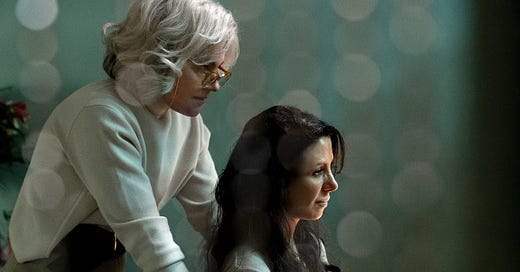Indy Film Fest -- Mitra
This searing drama is a tale of revenge and regret, as an Iranian mother who lost her daughter during the Islamic revolution encounters her betrayer decades later.
For Indy Film Fest showtimes and tickets, please click here.
Lately it has come into vogue for people to embrace forgiving those who have wronged them, even if the person hasn’t actually apologized — or even acknowledged the harm they caused. This mindset is often couched in spiritual terms, as in the act of forgiving is more beneficial to the soul of the forgiver than it is the forgived.
Personally, I don’t buy it. Forgiveness is a relationship based on give-and-take. It cannot be given if it is not asked for — otherwise, to my mind, it’s valueless.
“Mitra” is a searing drama that looks at revenge and regret, the act of forgiveness and the resistance to it happening, both for the asker and the giver. Its message pushes back against opinions like mine, and offers reasons why maybe it truly is better to forgive than hold onto grudges.
Jasmin Tabatabai plays Haleh Daneshi, a celebrated professor and advocate for human rights who’s recently retired in the Netherlands, where she’s lived for many years after emigrating from her native Iran. As a progressive and educated woman, she was a natural target for the Islamic fundamentalists who took over in the revolution — her and her family.
As we learn in the opening minutes, her daughter, Mitra Chupan (Dina Zarif), a young activist who fought the Islamists, was captured and executed back in 1982. Now in the present day of 2019, Haleh has an unexpected encounter: the woman who betrayed Mitra so many years ago, leading to Mitra’s death and the imprisonment of Haleh’s brother, Mohsen (Mohsen Namjoo).
She is approached by The Organization, an international group of Iranian expats who ostensibly work to overthrow the regime, but mostly look to exact revenge upon traitors who wronged them. It’s made clear by their agents that one word from Helah confirming the identity of the woman, who recently moved to the Netherlands, and she’ll be snatched away for interrogation and death.
Tabatabai gives a commanding performance as a powerful, self-assured woman who made a life for herself in the wake of tragedy. Now she is sucked back into the powerlessness she felt nearly four decades earlier.
At first she dismisses the notion, telling the Organization people to forget about it. But she seeks the woman out, first as an observer and then in person, and becomes convinced she is the traitor. Haleh spends the rest of the movie contemplating what to do.
The woman, known then as Leyla Hashemi but now as Sare (Shabnam Toloui), is a bit of sphinx who never shows her cards. She is initially wary of Haleh, who presents herself as a nice older lady who likes to befriend new arrivals from Iran. But as Haleh bestows her kindness on her and her teen daughter, Nilu (Avin Manshadi), driving them around and showing them Persian stores, she opens up and seems to genuinely embrace the friendship.
Mohsen, who has become a virtual hermit after his prison ordeal, urges his sister to leave the matter alone. But he finds himself getting caught up in the deception. Both he and Haleh clearly see Nilu as a replacement for Mitra, and that pulls both for and against the desire for vengeance. Haleh thinks about getting rid of her daughter’s killer (in her mind) and taking her own child as compensation.
Writer/director Kaweh Modiri juggles some big emotions and issues without ever falling back on easy answers or formulaic outcomes. The characters act as real people in such a dire situation would, not as puppets in a simple revenge story.
We find ourselves feeling both empathy and revulsion for Haleh, a woman who has suffered terrible pain but is tempted by reciprocating the darkest of urges. We even experience some sympathy for Sare/Leyla, who was likely forced into doing what she is accused of.
The film is well-shot with solid production values. I might quibble with how the huge timeline jump is handled. Tabatabai and Namjoo’s characters must be in their 80s in the modern section, and are given rather outlandish gray wigs but little in the way of aging makeup. The effect is rather unconvincing. Sare’s character appears to be in her late 30s but must be closer to 60.
Still, the cast pushes past these outward dressings and convinces us these people have worn the weight of their years.
“Mitra” raises uncomfortable questions about morality that aren’t easily solved in the course of a 107-minute film. Haleh begins the story with a large reserve of moral authority, but gradually fritters it away as she undertakes a journey to reclaim her daughter’s stolen life in a very human and understandable way.
Despite what we might like to think, hate can sustain you. Haleh built an entire, admirable life based on the hate born from her daughter’s murder. But now she is confronted with a way to exchange it for something else — revenge, or absolution.
It’s not as easy a bargain as you might think.





